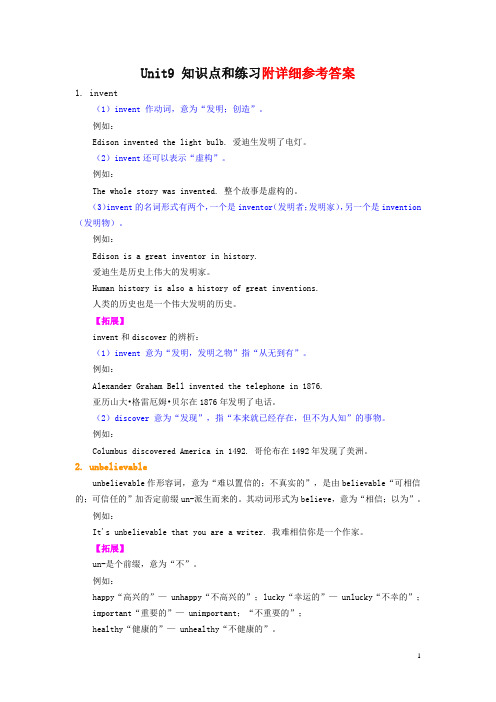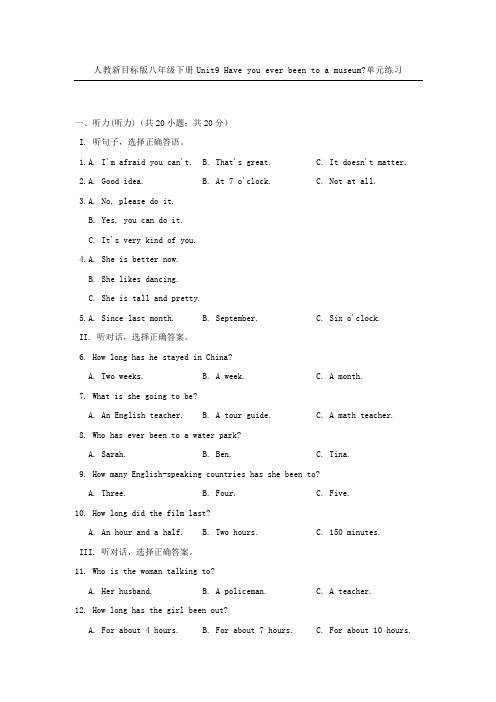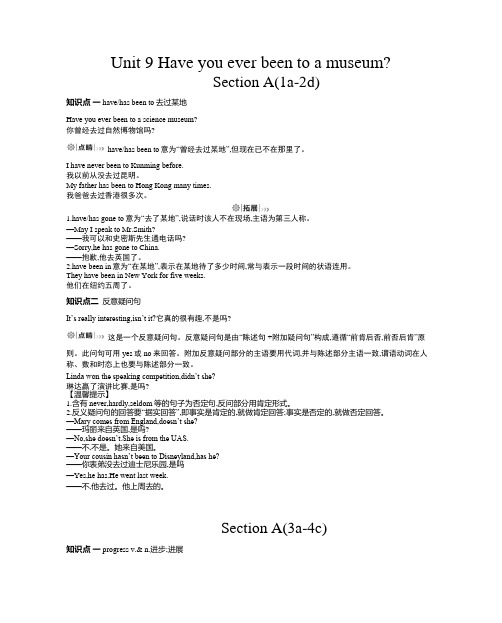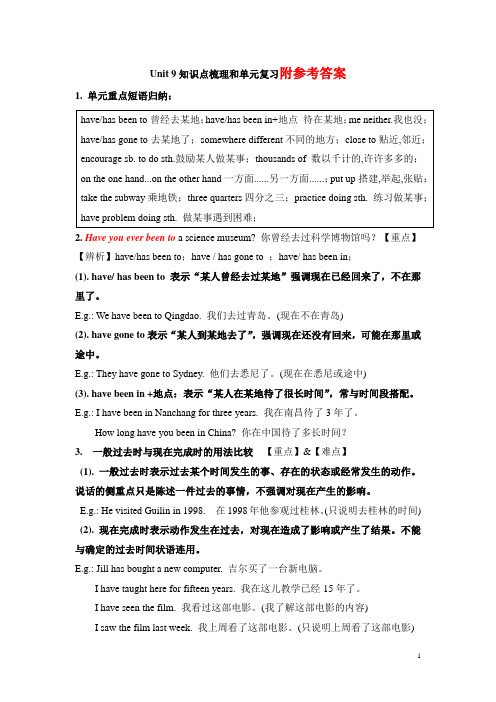新课标人教版八年级英语下册Unit 9 Have You Ever Been to an Amusement Park同步练习
人教版新目标英语八年级下册:Unit 9《Have you ever been to museum》 讲解+练习题目+答案

Unit9 知识点和练习附详细参考答案1. invent(1)invent 作动词,意为“发明;创造”。
例如:Edison invented the light bulb. 爱迪生发明了电灯。
(2)invent还可以表示“虚构”。
例如:The whole story was invented. 整个故事是虚构的。
(3)invent的名词形式有两个,一个是inventor(发明者;发明家),另一个是invention (发明物)。
例如:Edison is a great inventor in history.爱迪生是历史上伟大的发明家。
Human history is also a history of great inventions.人类的历史也是一个伟大发明的历史。
【拓展】invent和discover的辨析:(1)invent 意为“发明,发明之物”指“从无到有”。
例如:Alexander Graham Bell invented the telephone in 1876.亚历山大•格雷厄姆•贝尔在1876年发明了电话。
(2)discover 意为“发现”,指“本来就已经存在,但不为人知”的事物。
例如:Columbus discovered America in 1492. 哥伦布在1492年发现了美洲。
2. unbelievableunbelievable作形容词,意为“难以置信的;不真实的”,是由believable“可相信的;可信任的”加否定前缀un-派生而来的。
其动词形式为believe,意为“相信;以为”。
例如:It's unbelievable that you are a writer. 我难相信你是一个作家。
【拓展】un-是个前缀,意为“不”。
例如:happy“高兴的”— unhappy“不高兴的”;lucky“幸运的”— unlucky“不幸的”;important“重要的”— unimportant;“不重要的”;healthy“健康的”— unhealthy“不健康的”。
人教新目标英语八年级下册讲义—Unit 9 Have you ever been to a ……

新目标八年级下册Unit 9 Have you ever been to a museum ?讲义一、重点单词1. amusement n. 娱乐; 游戏2. somewhere adv. 在某处; 到某处3. camera n. 照相机; 摄影机; 摄像机4. invention n. 发明物5. invent v. 发明; 创造1. unbelievable adj. 难以置信的; 不真实的2. progress n. 进步; 进展3. rapid adj. 迅速的; 快速的4. unusual adj. 特别的; 不寻常的5. toilet n. 坐便器; 厕所6. encourage v. 鼓励7. social adj. 社会的8. peaceful adj. 和平的; 安宁的9. performance n. 表演; 演出10. perfect adj. 完美的; 完全的11. itself pron.(it的反身代词) 它自己12. collect v. 收集; 采集13. German adj. 德国的; 德语的; 德国人的n. 德语; 德国人14. theme n. 主题15. ride n. 供乘骑的游乐设施; 短途旅程16. province n. 省份17. simply adv. 仅仅; 只; 不过18. fear v. & n. 害怕; 惧怕19. whether conj. 不管......;还是); 或者......(或者); 是否20. Indian adj.印度的 n. 印度人21. Japanese adj.;日本的; 日本人的; 日语的n. 日本人; 日语22. equator n. 赤道23. whenever conj. 在任何......时候; 无论何时24. spring n. 春天25. mostly adv. 主要地; 通常26. location n. 地点; 位置二、短语归纳1.at night在夜晚2.in a more natural environment在一个更加自然的环境中3.all year round 全年4.be far from 离……远5.in the dark 在黑暗中6.in the past 在过去7.have been to sp. 去过某地8.science museum 科学博物馆9.history museum 历史博物馆10.amusement park 游乐园11.go somewhere different 去不同的地方12.go skating 去滑冰13.take the subway 坐地铁14.a great way to spend a Saturday afternoon一个过周六下午的好方法15.all the old movie cameras所有的古老的电影摄影机16.learn about sth.解有关……的情况17.on the weekend 在周末18.camp in the mountains 在大山里露营19.put up a tent搭帐篷20.in such a rapid way 以如此迅猛的方式21.different kinds of各种各样的22.development of toilets 厕所的发展23.social groups 社会团体24.the tea art performances茶艺表演25.make a perfect cup of tea with beautiful tea sets用漂亮的茶具沏一杯完美的茶26.a nice place to enjoy tea 一个品茶的好地方27.thousands of 数以千计的28.International Museum of Toilets国际厕所博物馆29.the Terracotta Army 兵马俑30.Southeast Asia东南亚31.Night Safari 夜间动物园32.three quarters 四分之三33.an English-speaking country一个讲英语的国家34.have problem doing sth. 做某事很困难35.during the daytime在白天36.a couple of times 好几次37.right now 现在;目前38.an amusement park with a special theme一个有特别的主题的游乐园39.walk around the park 在公园里到处走40.hear of 听说41.take a ride兜风42.another province另一个省43.the Bird’s Nest鸟巢44.encourage sb. to do sth.鼓励某人做某事45.on the one hand... on the other hand.一方面,另一方面三、句型集萃1.a great way to do sth一个做某事的好办法2.It’s unbelievable that很难相信……3.watch sb do sth.看某人做了某事4.encourage sb to do sth鼓励某人做某事5.as..as和。
Unit9Haveyoueverbeentoamuseum_SectionA1a-2c课件人教版英语

Free talk Have you ever been to a/an_...? Yes, I have. /No, I haven’t.
have been to (去过),可 以与never[从没], ever [曾经], just[刚刚], once [一次], before[之前]连接。
ahsnmsciapsiawetutaruonscatrrecetmeymemrmzumeopusnuuoeastsuserepeumkuuammrmk
“我也是”结构: So+助动词/情态动词/be+主语(肯定) “So+助动词/be动词/情态动词+主语I.”=Me,too.
Drills --I have ever been to _a_s_c_i_en__ce__m__u_se_u_m___.
Have you ever been there?
回答1:Yes, __I_h_a_v_e___.
➢ 拓展:表示后者与前者情形相同,即“……也不……”时, 常用Me neither.或neither/nor引起的倒装句: Neither/Nor+助动词/系动词be/情态动词+主语.
时态上与前文保持一致,数要与其后的主语一致。
例:—I have never been to a water park.
Look at the map of the town. Listen and circle the places you hear.
2b Listen again and circle T for true or F for false.
Conversation 1
1. Tina went to the space museum last year. T/F
新课标人教版八年级英语下册Unit 9 Have you ever been to an amuse

—So did Tina.
中国地图
蒂娜也去了。
—He has been a soldier for two years.
要点点拨
他已经当了两年兵了。
go inline skating 滑旱冰
—So have I.
我也是。
全析提示
3.Look at the map of the town.Listen and circle the places 助动词 have 和 has 可以与前面的
you hear.
主语缩略’ve 和’s。
看城镇的地图。听录音并圈出你听到的地方。
如:we’ve,they’ve,he’s,
water world 水上世界
it’s 等。
city library 城市图书馆
have not 常缩略为 haven’t,has
fun times amusement park
如果说“欢迎回家”该怎么说呢?
把 1a 中你的回答和你搭档的回答对照一下。
Wele back home!
4.For me,“I have to!” is number two.
对我来说“I have to!”是第二位的。
要点点拨
5.Listen to a teacher interview a student.Circle the newsletter 业务通讯;新闻信札
route“路线、小路、小巷”,使
The main attraction was a Charlie Chaplin film.
用 X 围也较小。course 表示船的
吸引人的主要是查理·卓别林的电影。
“航道”或飞机的“航线”。
The idea of being a teacher has little attraction to young
2015年新目标人教版八年级英语下册Unit9--Have-you-ever-been-to-a-m

A: Have you ever been to the Great Wall? B: No, I haven’t. What about you? A: Me neither. =Neither have I. =I haven’t been there, either. Neither+助动词/be动词/情态动词+主语.
4c. Answer the survey questions and then ask your partner.
Have you ever… You
been to another province in China? Lost something important?
Your partner
1.He ___h_a_s__ (have) ever been to Shanghai. 2.She _w__e_n_t___ (go) to the zoo last week. 3.I __h_a_v_e___ (have) ever been to Hong Kong. 4.They __h_a_v_e_n_’_t___ (not have) been to the 5. Great Wall. 5.A: ___H_a_s____ (have) she ever been to China?
1 have / has been to +地名 去过某地(去过已回来);
2 have / has gone to +地名 去了某地(还没回来);
3 have / has been in +地名 在某地住了有多长。
A: Have you ever been to the Great Wall? B:Yes, I have. What about you? A: Me too. =So have I. =I have ever been there, too. So+助动词/be动词/情态动词+主语.
人教新目标八年级英语下册Unit9 Have you ever been to a museum-单元练习【含答案】

人教新目标版八年级下册Unit9 Have you ever been to a museum?单元练习一、听力(听力)(共20小题;共20分)I. 听句子,选择正确答语。
1. A. I'm afraid you can't. B. That's great. C. It doesn't matter.2. A. Good idea. B. At 7 o'clock. C. Not at all.3. A. No, please do it.B. Yes, you can do it.C. It's very kind of you.4. A. She is better now.B. She likes dancing.C. She is tall and pretty.5. A. Since last month. B. September. C. Six o'clock.II. 听对话,选择正确答案。
6. How long has he stayed in China?A. Two weeks.B. A week.C. A month.7. What is she going to be?A. An English teacher.B. A tour guide.C. A math teacher.8. Who has ever been to a water park?A. Sarah.B. Ben.C. Tina.9. How many English-speaking countries has she been to?A. Three.B. Four.C. Five.10. How long did the film last?A. An hour and a half.B. Two hours.C. 150 minutes.III. 听对话,选择正确答案。
新人教版八年级英语下册 Unit 9 Have you ever been to a museum全单元课件

water park _____ 2
3 zoo _____
1 amusement park _____
1b. Listen. Have these students ever been to these places? Check (✓) the boxes.
Science History Art Nature Space museum museum museum museum museum Claudia Sarah
Unit 9
Have you ever been to a museum?
1a. Which of these places would you like to visit?.
space museum_____ 4 history museum ____ 6 art museum _____ 5
cup of tea with beautiful tea sets. Watching the tea preparation is just as enjoyable as drinking the tea itself. I‟ve finally realized why my grandpa loves drinking tea and collecting tea sets.
Quiet
made
quick
Language points
1.I learned about the inventions that led to color movies, too. 我还了解了一些发明,它们成就了彩色电影。 词about或of引入所获知的具体内容。例如:
此处learn是“了解;获知;得知”的意思,由介 The children were all shocked to learn of the
人教新目标八年级下册unit9全单元知识点

Unit 9 Have you ever been to a museum 1.with beautiful tea sets用美丽的茶具沏一杯完备的茶2. a nice place to enjoy tea 一个品茶的好地方3.thousands of 数以千计的4.International Museum of Toilets国际厕所博物馆5.the Terracotta Army 兵马俑6.Southeast Asia东南亚7.Night Safari 夜间动物园8.three quarters 四分之三9.an English-speaking country一个讲英语的国家10.have problem doing sth. 做某事很困难11.during the daytime在白天12. a couple of times 好几次13.right now 如今;目前14.an amusement park with a special theme一个有特殊的主题的游乐园15.walk around the park 在公园里到处走16.hear of 听说17.take a ride兜风18.another province另一个省19.the Bird’s Nest鸟巢20.encourage sb. to do sth.激励某人做某事21.on the one hand... on the other hand.一方面,另一方面1. Have you ever been to...Have you ever been to a science museum你曾经去过科学博物馆吗?2. Let’s. 。
Let’s go somewhere different today.我们今日去个不同的地方吧。
3. It’s~\~adj. +that...It9 s unbelievable that technology has progressed in such a rapid way!科技以如此迅猛的方式开展真是令人难以置信啊!4. Whether... , you,11...Whether you like Indian food,Western food or Japanese food, you’ll find it all in Sin gapore!不管你喜爱印度食品、西方食品还是日本食品,在新加坡你都能找到!5. One great thing. . is that. .One great thing about Singapore is that the temperature is almost the same all year round.新加坡一个很大的特征是它的气温几乎一年到头都是一样的。
新版八年级英语下册unit_9_have_you_ever_been_to_a_museum_Section_A_1

你曾经去过 博物馆吗?
语言目标: 讨论过去的 经历
1a Which of these places would you like to visit? Rank them from 1(most) to 6 (least).
space museum____ history museum____ art museum ____ zoo ____ water park ____ amusement park ____
Listening 2 2a
Look at the map of the town. Listen and circle the places you hear.
Listening 2 2b Listen again and circle T for true or F for false. Conversation 1 1. Tina went to the space museum last year. T/F 2. John has never been to the space museum. T/F 3. They are going to take the subway. T/F
improve
progress
unusual peaceful invented rapid
Have you ever been to science museum?
Yes, I’ve been to a science museum
No, I’ve never been to a science museum Yes, I have. I went there last year,/No, I haven’t. Me, too. And I’ve also visited the nature museum.
新课标人教版八年级英语下册Unit 9 Have You Ever Been to an Amuse

Unit 9 Have You Ever Been to an Amusement Park?一、学习目标:1.掌握现在完成时的用法;2.了解一般过去时、现在完成时和现在完成进行时的意义的区别;3.能够准确使用多种时态谈论自己的经历。
二、学习重点难点:1. 现在完成时由主语+have/has+过去分词构成。
其主要用法如下:I.在未指明具体时间的情况下,现在完成时动词通常可以表示在说话之前已经完成,而后果或影响至今仍存在的动作。
例如:The concert has started. 音乐会已经开始。
I have had breakfast. 我已吃过早饭。
注意:have gone to 和have been to 在意义上有区别。
例如:He has gone to Hong Kong. 他到某某去了。
(他已前往某某,或在途中,或已到达。
说话人暗示他现在不在现场。
)He has been to Hong Kong. 他曾到过某某。
(说话人认为他过去到过某某,现在已不在该地。
言外之意他对某某有所了解。
)II. 现在完成时动词可以表示开始于过去持续到现在(也许还会继续进行下去)的动作或状态。
例如:1) I have studied English since last year. 我从去年开始学习英语。
2) She has lived in Beijing for five years. 她住在已经五年了。
注意:e, go , leave, arrive, buy, lose, receive, join, die, bury 和marry 等动词所表示的动作是一时的,不能延续的,故不能与for …,since …等开头的表示一段时间的状语连用。
不过,这些词用于否定句则可以与表示持续的时间状语连用,即动作的不发生是可以持续的。
例如:不能说:*He has e to Beijing for two years.*He has bought that book for three weeks.*He has joined the Army for one and a half years.*His grandma has died for nine months.* I have received his letter for a month.可以说:He has been in Beijing for two years.He has had that book for three weeks.He has been in the army for one and a half years.His grandma has been dead for nine months.I haven't received his letter for almost a month.或者:It is two years since he came to Beijing.It is three weeks since he bought that book.It is one and a half years since he joined the Army.It is nine months since his grandma died.2. 现在完成时把过去的动作和现在的结果联系起来,一般过去时只限于表示过去的动作本身,与现在的结果无关。
新版新目标八下教案Unit-9--Have-you-ever-been-to-a-museum

《Unit 9 Have you ever been to a museum? 》一、教学目标:1. 语言知识目标:掌握如何表达现在完成时,并能运用Have you ever been to an amusement park? Has he ever been to an amusement park? 的句式进行提问和应答。
2. 情感态度价值观目标:能用英语谈论过去的经历,谈论你曾经去过某地。
二、教学重点:(1)掌握本课的生词、短语和本课所出现的日常交际用语。
(2)掌握有关于“某人曾经去过某地”的交际用语:Have you ever been to an amusement park? Yes, I have. / No, I haven’t.Has he ever been to an amusement park? Yes, he has. / No, he hasn’t.三、教学难点:(1)熟练掌握和灵活运用现在完成时来描述某人曾经去过某地。
(2)能区别现在完成时和一般过去时在表达过去经历的不同。
四、教学方法:Task-based and communicative teaching methods.五、授课时间:6.6——6.8六、课时安排:4课时七、教学过程:Period 1Step 1 RevisionPlay the song “If you are happy, please clap your hands. (播放一首“幸福拍手歌”,让学生跟着一起唱,老师赶紧因势引导,问全班同学:)T: Do you know the name of this song?Ss: Yes, “If I am happy, I’ll clap my hands”.T:(教师重复并问学生)If you are happy, you’ll clap your hands. Are you happy today?Ss: Yes.T: If you are happy, please clap your hands.Ss: ××, ××, ××(学生们一起拍手)T:(问一名学生)If you are happy. What will you do?S1:If I am happy, I’ll go to the movies.T:(问另外一名学生)What about you?S2: I’ll go out for a visit but I don’t have enough money.T:(问另外一名学生)If you have a lot of money. What will you do?S3: If I am happy, I’ll buy a big house for my parents.T: Good boy. (Ask another student.) What about you?S4: I’ll give most of the money to the poor.T: How about you?Ss: I’ll travel around the world.T: Have you ever been to America?Ss: No.T: Now, we’ll learn Unit 9 Have you ever been to an amusement park?(播放歌曲,营造轻松愉快的学习氛围,并因势引导,采用师生之间的交流方式,自然导入“Have you ever been to an amusement park?”(“你曾经去过某地”这一话题)。
人教新目标版初中英语八年级下册Unit9Haveyoueverbeentoamuseum要点讲解

Unit 9 Have you ever been to a museum?Section A(1a-2d)知识点一have/has been to去过某地Have you ever been to a science museum?你曾经去过自然博物馆吗?have/has been to意为“曾经去过某地”,但现在已不在那里了。
I have never been to Kunming before.我以前从没去过昆明。
My father has been to Hong Kong many times.我爸爸去过香港很多次。
1.have/has gone to意为“去了某地”,说话时该人不在现场,主语为第三人称。
—May I speak to Mr.Smith?——我可以和史密斯先生通电话吗?—Sorry,he has gone to China.——抱歉,他去英国了。
2.have been in意为“在某地”,表示在某地待了多少时间,常与表示一段时间的状语连用。
They have been in New York for five weeks.他们在纽约五周了。
知识点二反意疑问句It’s really interesting,isn’t it?它真的很有趣,不是吗?这是一个反意疑问句。
反意疑问句是由“陈述句 +附加疑问句”构成,遵循“前肯后否,前否后肯”原则。
此问句可用yes或no来回答。
附加反意疑问部分的主语要用代词,并与陈述部分主语一致,谓语动词在人称、数和时态上也要与陈述部分一致。
Linda won the speaking competition,didn’t she?琳达赢了演讲比赛,是吗?【温馨提示】1.含有never,hardly,seldom等的句子为否定句,反问部分用肯定形式。
2.反义疑问句的回答要“据实回答”,即事实是肯定的,就做肯定回答;事实是否定的,就做否定回答。
—Mary comes from England,doesn’t she?——玛丽来自英国,是吗?—No,she doesn’t.She is from the UAS.——不,不是。
人教版英语八下U9Have you ever been to a museum 讲义

Unit9 Have you ever been to a museum?一、重点词汇及拓展1. amusement n. 娱乐;游戏e.g. The old ladies played the games just for amusement.老太太们玩这个游戏只是为了取乐。
amuse v. 消遣,逗笑;使开心,使愉快amusing adj. 有趣的,好玩的,好笑的amused adj. 被逗乐的;感到好笑的2.amusement park 游乐场e.g. The amusement park is open from May through October.游乐园从五月到十月开放。
3.somewhere adv. 在何处;到某处pron. 某个地方e.g. Maybe the keys are somewhere in the dining room.也许钥匙在餐厅某个地方。
I need to find somewhere to stay tonight.我得找到今晚要住的地方。
4.camera n.照相机;摄影机;摄像机e.g. I heard your parents bought you a cameras as a gift.我听说你的父母亲给你买了一台照相机作为礼物。
5.invention n.发明;发明物e.g. Do you think mobile phone is a great invention?你认为手机是一个伟大的发明吗?6.invent v.发明;创造inventor n.发明家invention n.发明;发明物e.g. As we all know that Edison invented light bulb.我们都知道爱迪生发明了灯泡。
7. unbelievable adj. 难以置信的;不真实的unbelievably adv. 难以置信地;不真实地unbelievably bad/good 坏得/好得令人难以置信incredible adj. 难以置信的e.g. I still find this story both fascinating and unbelievable.我仍然觉得这个故事非常有趣和难以置信。
八年级英语下册Unit9Haveyoueverbeentoanamusementpark词汇详细用法人教新目标版

Unit 9 Have you ever been to an amusement park ?68页1.amusement [ u ] 娱乐、消遣an amusement park 游乐场Have you ever been to an amusement park? 你曾经去过一个游乐场吗?Fun Times Amusement Park 欢乐时光游乐场。
复习have been to 去过,回来了have gone to 去了,现在不在这里have been in 去了,还在那里2. neither① adj. pron 二者都不Neither answer is correctNeither of the answers is / are correct.Which do you like? Neither I think they’re both ugly.② adv. 也不I don’t know. Me neither. I don’t know, either.70页3. Disneyland 迪斯尼乐园(前无冠词)Have you ever been to Disneyland?In fact, there are now several different Disneyland amusement parks around the world. 事实上,现在世界上有好几处不同的迪斯尼游乐场。
around the world = all over the worldacross China = all over China4. Mickey Mouse 米老鼠5. Donald Duck 唐老鸭6. character①性格I know his character very well.②汉字Chinese characters③人物、角色famous characters from Chinese historyDisney characters 迪斯尼人物Mickey Mouse and Donald Duck are famous Disney characters.7. seen see的过去分词。
人教版 八年级英语 下册 Unit_9_Have_you_ever_been_to_a_museum

dish.
Tapescripts:
Boy 1: So, Peter, how long have you been in China? Peter: I’ve been here for two weeks, but I’m going back to Australia tomorrow. Boy 1: Have you traveled much? Peter: Yes, I have. I’ve seen many interesting things. Boy 1: Have you visited the Palace Museum? Peter: Yes, I have. I went there last week. It was wonderful. There were so many beautiful treasures. Boy 1: And have you been to the Great Wall?
1st listening
1b
Listen to a student interviewing a foreign student. Check (√) the questions you hear.
___√_ Have you visited the Palace Museum?
___√_ Have you been to the Great Wall?
人教版八年级英语下册Unit9 Have you ever been to a museum知识点梳理及单元复习

Unit 9知识点梳理和单元复习附参考答案1. 单元重点短语归纳:have/has been to曾经去某地;have/has been in+地点待在某地;me neither.我也没;have/has gone to去某地了;somewhere different不同的地方;close to贴近,邻近;encourage sb. to do sth.鼓励某人做某事;thousands of 数以千计的,许许多多的;on the one hand...on the other hand一方面......另一方面......;put up搭建,举起,张贴;take the subway乘地铁;three quarters四分之三;practice doing sth. 练习做某事;have problem doing sth. 做某事遇到困难;2. Have you ever been to a science museum? 你曾经去过科学博物馆吗?【重点】【辨析】have/has been to;have / has gone to ;have/ has been in;(1). have/ has been to 表示“某人曾经去过某地”强调现在已经回来了,不在那里了。
E.g.: We have been to Qingdao. 我们去过青岛。
(现在不在青岛)(2). have gone to表示“某人到某地去了”,强调现在还没有回来,可能在那里或途中。
E.g.: They have gone to Sydney. 他们去悉尼了。
(现在在悉尼或途中)(3). have been in +地点:表示“某人在某地待了很长时间”,常与时间段搭配。
E.g.: I have been in Nanchang for three years. 我在南昌待了3年了。
How long have you been in China? 你在中国待了多长时间?3. 一般过去时与现在完成时的用法比较【重点】&【难点】(1). 一般过去时表示过去某个时间发生的事、存在的状态或经常发生的动作。
人教版新目标英语八年级下册:Unit 9《Have you ever been to a museum》知识点梳理及单元复习

Unit 9知识点梳理和单元复习附参考答案1. 单元重点短语归纳:2. Have you ever been to a science museum? 你曾经去过科学博物馆吗?【重点】【辨析】have/has been to;have / has gone to ;have/ has been in;(1). have/ has been to 表示“某人曾经去过某地”强调现在已经回来了,不在那里了。
E.g.: We have been to Qingdao. 我们去过青岛。
(现在不在青岛)(2). have gone to表示“某人到某地去了”,强调现在还没有回来,可能在那里或途中。
E.g.: They have gone to Sydney. 他们去悉尼了。
(现在在悉尼或途中)(3). have been in +地点:表示“某人在某地待了很长时间”,常与时间段搭配。
E.g.: I have been in Nanchang for three years. 我在南昌待了3年了。
How long have you been in China? 你在中国待了多长时间?3. 一般过去时与现在完成时的用法比较【重点】&【难点】(1). 一般过去时表示过去某个时间发生的事、存在的状态或经常发生的动作。
说话的侧重点只是陈述一件过去的事情,不强调对现在产生的影响。
E.g.: He visited Guilin in 1998. 在1998年他参观过桂林。
(只说明去桂林的时间)(2). 现在完成时表示动作发生在过去,对现在造成了影响或产生了结果。
不能与确定的过去时间状语连用。
E.g.: Jill has bought a new computer. 吉尔买了一台新电脑。
I have taught here for fifteen years. 我在这儿教学已经15年了。
I have seen the film. 我看过这部电影。
新目标英语八年级(下)Unit9 Have you ever been to an amusement park?

Me neither :我也不;我也没有
so have I = Me too:我也一样;我也*******
EXERCISE for this class
an • 1.Have you ever been to _____ amusement park? • -Yes,I have. • 2.Have you ever been to a water park ? haven`t —No.I ________. • 3.I have been to the Great Wall,Lily. too • ---Me ______. • 4.I have never been to Japan,Tom. neither • —Me __________. • 5. I have ever been to Shanghai,Jerry. So • —______ have I.
• Have/has been to 已经去过;曾经到过 已经去过;
have / has + P.P 已经.....;曾经....
现在完成时
Sarah: I`m bored, Claudia. Let`s do something different. Claudia: Have you ever been to an amusement park? Sarah: Yes,I have.I went to Fun Times amusement park last year. Have you ever been to a water park ? Claudia: No,I have`t ,Sarah. Sarah: Me neither.(我也没有)Let`s go to Water City tomorrow! Claudia: Well,that sounds fun,but I can`t swim. Sarah: Really?I didn`t know that.Well,how about the zoo? Have you ever been to the zoo? Claudia: I have been to the zoo a lot of times. Sarah: Me too.(我也去过)And I have been to the aquarium also. Claudia: So have I, sarah,I went there on our last school trip. Sarah: I know, Claudia.Let`s go to the space museum. I`ve never been there. Claudia: That`s a good idea.I went there last year, but I`d like to go there again.
八年级英语下册Unit9Haveyoueverbeentoamuseum单元语法知识梳理人教版

Unit 9 Have you ever been to a museum现在完成时(Ⅱ)1.现在完成时表示经历的用法现在完成时常用have been to(去过),ever(曾经),never(从没)等表示经历。
用法说明示例have / has been to表示去过某地,可以与never,ever,just,once等连用。
Mr. Smith has ever been to China three times.史密斯先生曾去过中国三次。
ever常用于现在完成时的一般疑问句中,放在主语之后,过去分词之前。
Have you ever visited the Palace Museum? 你曾参观过故宫博物馆吗?never表示否定,用在助动词have / has之后,过去分词之前。
表示否定的简短回答可以用neither。
—I have never been to Hong Kong.我从来没去过香港。
—Me neither.我也没去过。
2.have/ has been to与have / has gone to的用法区别用法说明示例have/ has been to意为“去过某地”,表示去过某地,现在已经回来了,通常与表示次数的状语连用,如twice,several times,ever,never等She has been to Europe twice.她去过欧洲两次。
(已经回来了)I have never been to the Great Wall.我从未去过长城。
have / has gone to意为“去了某地”,表示到某地去了,强调说话时去某地的人不在场(可能在途中,也可能已到达)。
—Where is Jim? 吉姆在哪里?—He has gone to England.他去英国了。
(现在不在这里)若have/ has been to或have / has gone to后接副词,则省略to。
- 1、下载文档前请自行甄别文档内容的完整性,平台不提供额外的编辑、内容补充、找答案等附加服务。
- 2、"仅部分预览"的文档,不可在线预览部分如存在完整性等问题,可反馈申请退款(可完整预览的文档不适用该条件!)。
- 3、如文档侵犯您的权益,请联系客服反馈,我们会尽快为您处理(人工客服工作时间:9:00-18:30)。
Unit 9 Have You Ever Been to an Amusement Park同步练习Ⅰ.单项选择。
( ) 1. What were you ___ nine yesterday evening?A.do…at B.doing …at C.did…on D.did…at( ) 2. – How long have you ___ here? –About two months.A.been B.gone C.come D.arrived( ) 3. ___ the population of Germany?A.How many B.What C.How many people D.What’s( ) 4. I’m sorry. We’ve ___ the shoes in your size.A.paid for B.put on C.sold out D.put away( ) 5. If you don’t k now this word, ___ in the dictionary.A.look for it B.look at it C.look after it D.look it up( ) 6. -His father didn’t go to work today, did he ?-___.A.No, he didn’t B.Yes, he didn’t C.No, he did D.Yes, he was( ) 7. How many English words ___ since you come to our school?A.do you learn B.will you learnC.did you learn D.have you learned( ) 8. A new railway ___ between the two cities.A.will be built B.will build C.turn up D.turn down( ) 9. I rang her up yesterday, but nobody ___ it.A.held on B.picked up C.answered D.telephoned( ) 10. She ___ to the Great Wall several times.A.goes B.has gone C.went D.has beenⅡ.阅读理解( A )In the face of your broth er’s teacher you failed in respecting your mother! Let this never happen again, my Enrico, never again!Your word hurt my heart like a point of steel. I thought of your mother when years ago, she bent of whole one night over your little bed, watching your breathing weeping in her worries, and with her teeth chattering with terror, because she thought that she had lost you; and I feared that she would lose her reason. And at this thought I felt a feeling of horror at you. You, to hurt your mother …! Listen, Enrico. Fix this thought well in your mind. Just think that you are sure to experience many terrible days in the course of your life; the most terrible will be that on which you lose your mother. How you will then remember every bitterness that you have caused her, and with what regret you will pay for all, unhappy creature! Hope for no peace in your life, if you have caused you will pay for all, unhappy creature! Hope for no peace in your life, if you have caused your mother sorrow and sadness.I love you, my son; you are the dearest hope of my life; but I would rather see you dead than ungrateful to your mother.( ) 1. Enrico’s father wrote the letter because ___.A.Enrico had fallen ill B.his son was the dearest hope of his lifeC.Enrico’s mother had lost her reasonD.Enrico had been rude to his mother( ) 2. Enrico’s father hoped that ___.A.Enrico would not hurt his mother’s feeling any moreB.Enrico would talk to his motherC.Enrico would take care of his motherD.Enrico could apologize to his mother( ) 3. If Enrico died at that time, his mother would probably ___.A.have died, too B.have gone madC.have been worried D.have been terrified( ) 4. According to Enrico’s father, the most terrible day in the course of one’s life is the day when ___.A. his mother diesB. his father diesC. his brother diesD. he himself dies( ) 5. Enrico should have respected his mother because ___.A.his mother had been grateful to himB.his father would rather see him dead that ungrateful to his motherC.his mother had been very good to himD.his mother had loved him more than his father had( B )Hundreds of years ago, news was carried from place to place by people on foot or by horse, which took days, weeks and sometimes months for people to receive news. Now it is possible to send words and pictures around the world in seconds. Billions of people learn about news stories of their mother country and all over the world every day, either by watching TV or reading newspapers. Newspapers have been an important part of everyday life since the 18th century? Many countries have hundreds of different newspapers. How do newspaper editors decide which news stories to print? Why do they print some stories and not others? What makes a good newspaper story? Firstly, it is important to report new stories. TV stations can report news much faster than newspapers. Yet, newspapers give more about the same story. They may also look at the story in another way, or they may print completely different stories to show on TV.Secondly, a news story has to be interesting and unusual. People don’t want to read stories about everyday life. As a result, many stories are about some kind of danger and seem to be “bad” news. For example, newspapers never print stories about planes landing safely, instead they print stories about plane accidents.Another factor is also very important in many news stories. Many people are interested in news in foreign countries, but more prefer to read stories about people, places and events in their own country. So the stories on the front page in Chinese newspapers are usually very different from the ones in British, French and American newspapers.( ) 1. According to the passage, how do people learn about news stories in the world now?A.They carry news stories and tell others from place to place on foot or by horse.B.They tell each other what they have seen with their eyes.C.They watch TV or read newspapers.D.They listen to the radio every day.( ) 2. The different between newspaper stories and TV news reports is that ___.A.people can learn more about the same news story from a newspaperB.people can read the news story more quickly in a newspaperC.people can read news stories in other countriesD.people can read news stories about their own country( ) 3. To make a good newspaper story, how many factors does the passage talk about?A.Two B.Three C.Five D.Six( ) 4. According to the passage, which of the following can you most possibly watch on TV?A.You often play football with your friends after school.B.Your teacher has got a cold.C.A tiger in the city zoo has run out and hasn’t been caught.D.The bike in front of your house is lost.( ) 5. Which of the following is Not true in this passage?A.News stories on the front page of every country are always the same.B.People like to read interesting and unusual news.C.Not only TV but also newspapers can help people to learn what is happening around the world.D.Newspapers have been an important part of everyday life for more than three hundred years.Ⅲ.完型填空。
